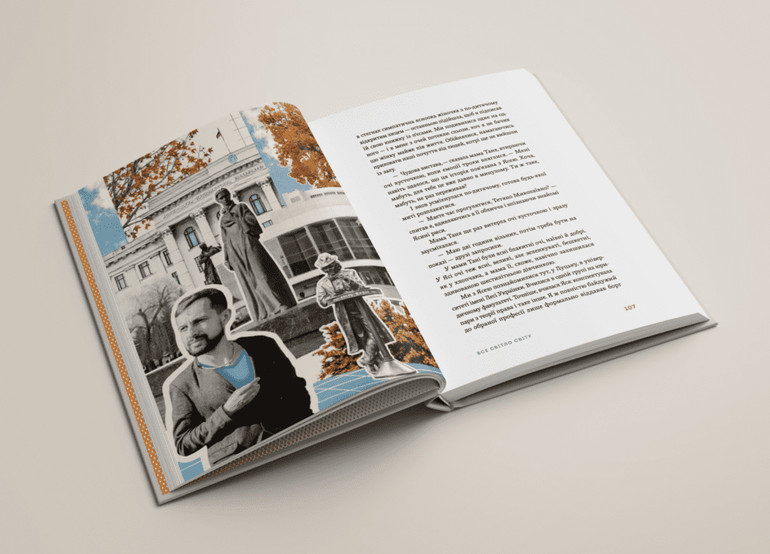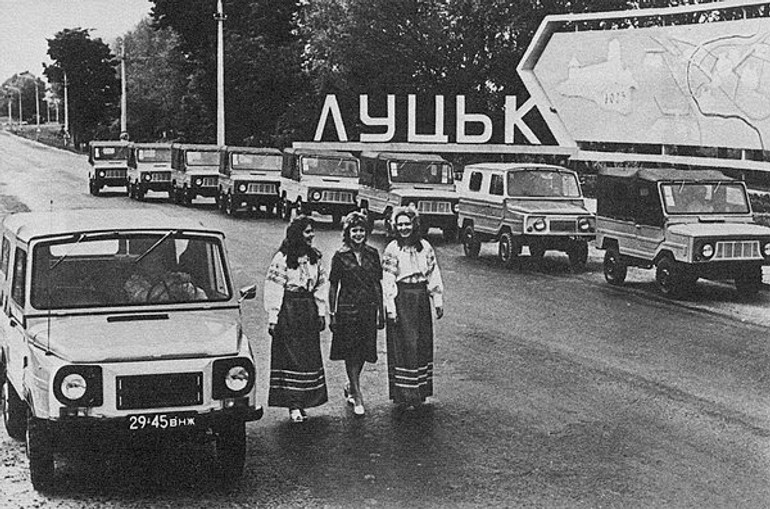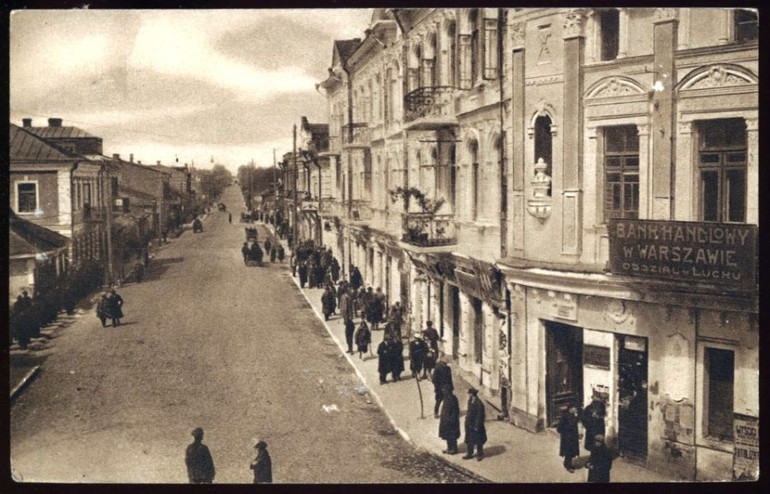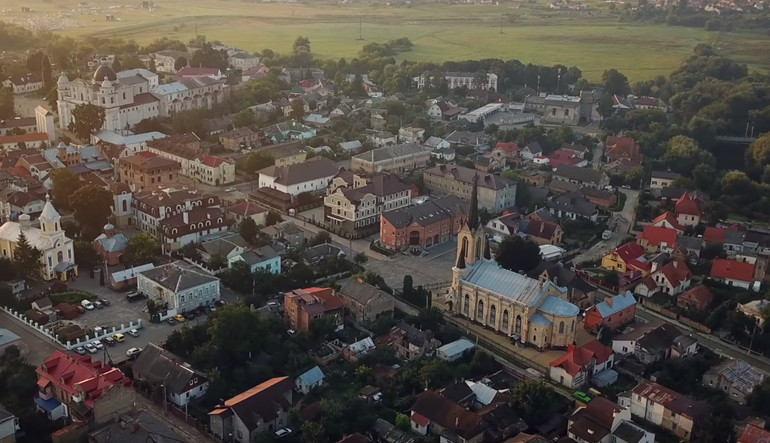texts about Lutsk through the eyes of Zabuzhko, Layuk, Kalytko, Deresh and Kidruk
[ad_1]
What is Lutsk like? What do we know about him? What stories does it hide? And which ones do not really belong to him? What of what we know about Lutsk is really Lutsk and not a crudely edited version of it that was meant to fit into imperial narratives?
Komora Publishing House presented a prose collection entitled “Tower through [о]”, which was the result of the stay of Ukrainian writers, namely Oksana Zabuzhko, Myroslava Laiuk, Kateryna Kalitko, Lyubka Deresha and Max Kidruk, at the Lutsk Literary Residence “City of Inspiration”. Literary columnist UP Culture of Arina Kravchenko has already read the collection and is ready for a conversation about the decolonization of Ukrainian cities through modern literature — a conversation that the new collection could not but inspire.
Things begin to exist when they are named. Cities are when they are written into history: childhood memories, failed romances, dreams of the future…
In our case, it is probably worth adding the following: the form in which cities exist on our mental maps depends on who and how they talk about this city in their texts.
Spreads from the publication
Lutsk Literary Residence “City of Inspiration”
The choice between Pidmogilny’s Kyiv and Bulgakov’s Kyiv, between Yanovsky’s or Bazhan’s Odessa and the Odessa of the “South Russian School” turned out to be an existential one. But many Ukrainian cities are just beginning this difficult road.
And the monument of Glory with the imperial eagle, which rises in the center of Poltava, reminding of the battle of Poltava, is only one example of the reaction of the imperial semi-disintegration, conserved in the so-called “province”.
And so, no matter how many sickles and hammers we dismantle at railway stations throughout the country, leaving a characteristic “kopeck” wasteland on each structure, all roads will continue to return us to the past. They will return, if they don’t name their cities anew, if they don’t look for the same “new” meanings of the signs of historical durability that have been erased by the empire.
The need for such a rethinking became even more acute because of the “great resettlement of peoples” provoked by Russia’s full-scale invasion of Ukraine. Nowadays, the faces of Ukrainian cities that are actually still unknown to us are changing even more rapidly. However, the curator of the Lutsk Literary Residence “City of Inspiration” Olga Olkhova-Sukhomlyn believes that Lutsk in particular, having become a refuge and shelter, has not lost “your need for self-presentation”city “just as faithfully, I would like to tell about my uniqueness, about my historical role and modern mission, about my comforts and mysteries, about my intrigues and mundanities, paradoxes and obviousness…”.

Spreads from the publication
Lutsk Literary Residence “City of Inspiration”
And indeed, all of us are now at an exceptionally important stage of researching our own cities, where the object of understanding and rediscovery is not only history and what emerges from it, but also modernity, every second changes in real time. The search for a medium that could provide this movement-research in both directions leads us to an unequivocal answer – literature, because, according to Olga Olkhova-Sukhomlynexactly “through the optics of the artistic word […] the city becomes a space of dreams, fantasy, thought, observation, fullness”.
Lutsk literary residence, the result of which was the prose collection “The Tower through [о]”, had the purpose of observation and filling. What is Lutsk like? What do we know about him? What stories does it hide? And which ones do not really belong to him? What of what we know about Lutsk is really Lutsk and not a crudely edited version of it that was meant to fit into imperial narratives?
The texts of the collection work with the urban myth in two different dimensions: historical (Zabuzhko and Wicket) and artistic (Laiuk, Deresh, Kidruk) – and cover all three time planes: past, present and future.
Lutsk is the main character here, a living organism with its own experiences, transformations and layers. By Kateryna Kalitkowhich transports the reader to the stormy beginning of the 20th century, is a character from “complex, multi-component heart”with “with all the variety of experiences inherent in such regions, with anxiety, innate specific openness”. The most interesting thing here is this through-and-through anxiety, which is commented on Oksana Zabuzhkoreferring to his own childhood memories.

Photos from Lutsk in the 20th century.
Volyn Post
Walking along the paths drawn by both writers, we feel tragic historical breaks, explore public and private biographies – both of them, by the way, feel like something intimate, something to which only the insiders are involved. Like frames from a movie, through whole decades, champions of Ukrainianism, whose names have been absorbed by the sands of time, and those who, on the contrary, painstakingly inlaid Russian into everyday life, into jokes, into songs, into the urban landscape, pass us by. “Be a piece of shit, I’m begging you, because otherwise it hurts me to look at you”– sums it up Oksana Zabuzhko colonial cultural policy unfolding in Lutsk in the 1960s.
“Categorical agreement with existence presupposes an aesthetic ideal of a world in which crap is denied and everyone behaves as if it does not exist at all. This aesthetic ideal is called kitsch. […] Human brotherhood on earth is possible only on the basis of kitsch“– writes another modern classic, Milan Kunderawho also tried to understand the nature of Soviet life.
In the world described by Zabuzhko and Kundera, one cannot have an inner origin and character, one cannot read the “wrong” books, one cannot pronounce poems too vividly from the stage, one must not go to the park to discuss really important things, because everything, “that violates kitsch is thrown out of life: any manifestation of individuality (after all, any difference is a spit in the face of a smiling brotherhood), any manifestation of skepticism (he who begins to doubt small things will later doubt serious things), irony ( because in the realm of kitsch, everything must be treated with respect)”.
Such instructions still have an impact on local cultural politics, and therefore deepen the state of numbness in post-Soviet uncertainty and infantile helplessness.

Photos from Lutsk in the 20th century.
Lutsk City Council
That is why “Tower through [о]” is a good workshop in the development of urban myth and deconstruction, and even the title indicates this. “Recently restored thanks to the extraordinary efforts of the founders and partner assistance [вежа Чорторийських] had one more challenge – to regain her name – the name of the founder of Prince Chortoriysky, with the first letter “o” in whose name they gladly manipulated, conflating, alienating the Ukrainian prince”– says in the preface Olga Olkhova-Sukhomlyn. The fight against habitual textual manipulation took a lot of time and effort, but the curator of the literary residence believes that even such a seemingly insignificant thing as changing a word is “a way to once again scrape off foreignness from one’s authentic background”because for “every letter is a story of efforts and efforts”.
No less important aspect of the collection were the short fiction stories about Lutsk, where the city appears rather as a background for rich and very different events. Important, because knowing history is just as important as recognizing the landscape. And even a hundred years later, it is just as pleasant to walk through the Kiev of Pidmogilnoy as it was the Kiev of Sofia Andruhovych, and the Odesa of Yanovsky and Bazhan is no less impressive than the Odesa of Yvan Kozlenka.

Modern Lutsk
Lutsk has long needed fresh stories and new voices. I am sure that thanks to initiatives like the City of Inspiration, this is only the beginning of a long, exciting and much-needed road that will help, quoting Kateryna Kalitko “to sew together now this great, unchristened, often confused and uncertain country”.
[ad_2]
Original Source Link











